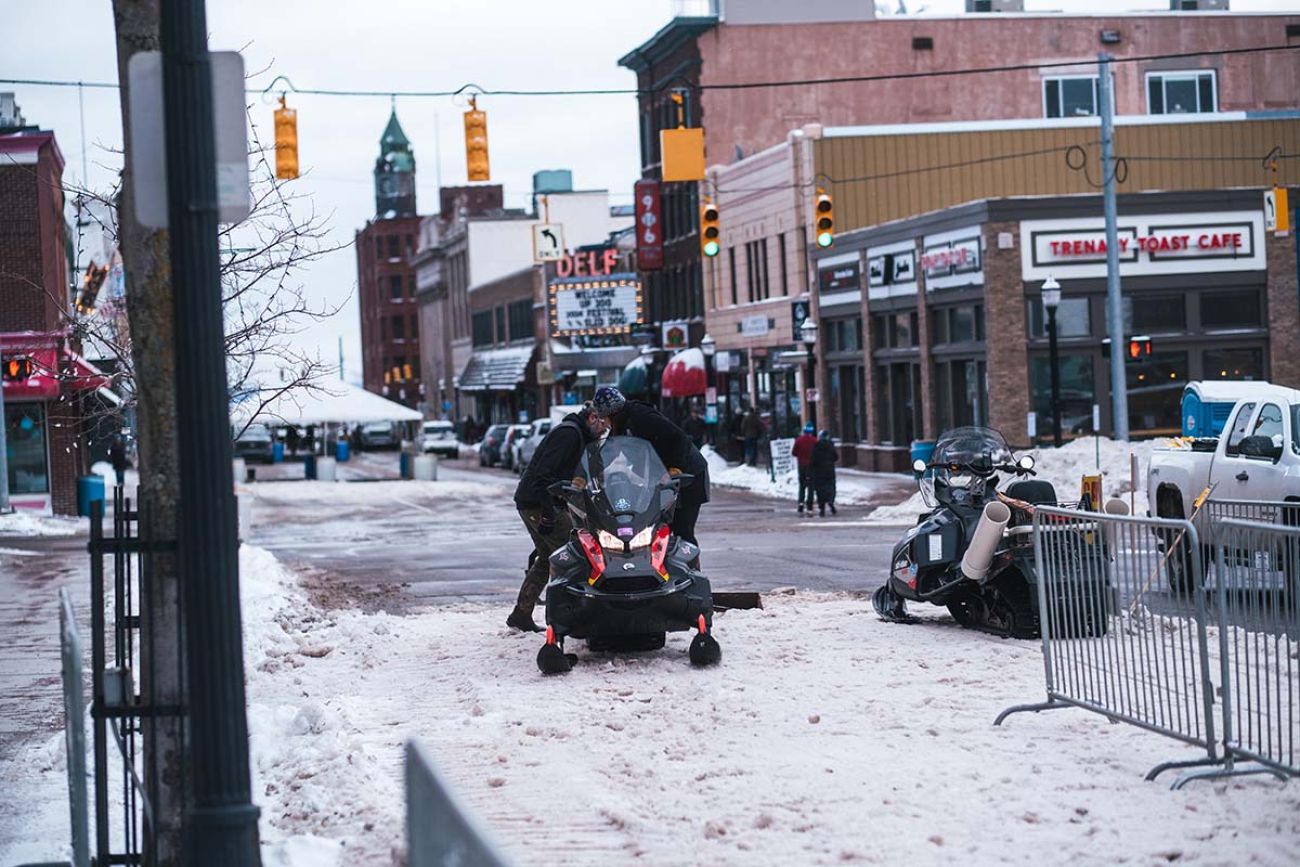Climate change is erasing Michigan winters, taking our heritage with them

Snowmobiles are stationed on a block-long snow trail in downtown Marquette. Without enough snow to host the annual UP200 dog sled race, event organizers pivoted to a festival, hauling snow downtown to create a short trail for mushing and other activities. Bridge photo by Ryan Stephens.
by Kelly House (Bridge Michigan)
Most snowmobile trails aren’t groomed until there’s at least 8 inches of snow on the ground. It’s 6 inches for a cross-country ski trail.
Walking on a frozen lake requires 4 inches of clear ice. And it’s hard to control a dogsled when daily thaws turn the trail into a sheet of ice.
For generations, Michiganders didn’t need to pay much attention to those limits. Our winters are known for being consistently — sometimes maddeningly — long, cold and snowy.
Or at least, they were.
“Everybody always says, ‘Oh, there's next year,’” said Jacob Piper, 23, of East China. But after the latest in a string of miserable ice fishing seasons, he has drawn a different conclusion: “Climate change is here. It’s happening. And it sucks.”
As Michigan closes out the warmest winter on record for much of the state, experts say the past few months are a prelude to the future. Winter, as generations of Michiganders have known it, is disappearing. And it’s taking with it a shared heritage that helps define what it means to be a Michigander — one marked by proudly embracing the cold, wearing fur coats in Detroit, playing pond hockey in Rochester Hills and mushing in Marquette.
The sense of loss will accelerate with each lost winter, predicted Nancy Langston, an environmental historian at Michigan Technological University.
“We don’t realize how much it defines us until it suddenly vanishes,” she said.
Earlier this month, as Piper searched for good ice, Darlene Walch found herself announcing for the second straight year that Michigan’s longest sled dog race, the UP200, was canceled due to warm weather. Even in the famously wintry Upper Peninsula, daytime highs had been at or above freezing for nine straight days and would stay that way for eight more.
“I am not a meteorologist. I’m just looking out the window and looking at the thermometer and going, ‘Wow, this doesn’t feel like February,” said Walch, president of the Upper Peninsula Sled Dog Association, which hosts the UP200.
The next day, the sun beat down on bare asphalt while a man in shorts lingered near the starting line of the canceled Michigan Snowmobile Festival in Gaylord. The city in the middle of Michigan’s snowbelt historically has averaged 12 feet of snow per winter. This year, it's received half that.
Michigan’s winters have warmed for decades now, while scientists warned of more dramatic changes ahead if society continues burning fossil fuels that release greenhouse gases into the atmosphere. The difference this year?
“It’s crossing the freezing line,” said Richard Rood, a professor emeritus of climate and space sciences and engineering at the University of Michigan.
“And it’s all of a sudden very obvious, to very many people.”
Daffodils in February
Across the Great Lakes, daily maximum temperatures this winter have averaged 5 degrees to 10 degrees above average. Snowfall has been paltry and quick to melt.
It is tempting to blame El Niño, a cyclical phenomenon in which weak Pacific trade winds cause warmer and dryer weather in parts of the northern U.S. and Canada — and many have.
But multiple experts who spoke to Bridge said El Niño’s effects are minimal in this part of the country. And this year’s cycle isn't particularly severe.
“This is not what an El Niño winter is typical of,” said Sapna Sharma, a climate expert and professor in the biology department at York University in Ontario. “We’ve had El Niño winters in the past…we also know that year after year, we’re breaking records for the warmest global air temperatures in recorded history.”
Winters are heating especially fast, and are expected to warm several degrees more by mid-century. As those changes escalate, experts say Michigan’s average winter will look a lot like the winter of 2024.
By the 2050s, most of Michigan will be “muddy and sodden” in the winter, with less snow, more rain and crocuses and daffodils blooming in February, Rood said.
“Snow in Detroit will be more like snow in North Carolina — a very rare event,” he said.
Michigan’s erratic day-to-day weather (“If you don’t like the weather, wait five minutes”) can mask those long-term trends.
Indeed, slight warming may lead to more snow in parts of the state, said James Kessler, a scientist at the National Oceanic and Atmospheric Administration’s Great Lakes Environmental Research Laboratory in Ann Arbor.
That’s because when the Great Lakes fail to freeze over, Michigan gets lake-effect storms caused by cold winds whipping across the water, picking up moisture and dumping it on land. Increasingly, that moisture is coming down as rain or melting within days.
Lake ice is getting thinner, too. This year, the Great Lakes maxed out at just 16 percent ice cover — less than a third of normal. By mid-century, many inland lakes will fail to consistently freeze over at all, said Sharma, who has extensively studied the topic.
That means ice fishing season will become shorter and more dangerous — if it arrives. And across much of the state, skating and skiing will be activities confined to resorts and arenas capable of making artificial snow and ice.
“There will be loss,” Rood said.
Northern people
Disappearing winters threaten Michiganders’ collective identity, said Langston, the Michigan Tech historian.
“We're northern people, who have chosen to live in a cold, remote place at the edge of the universe,” Langston said. “And people who live here are really proud of that.”
For generations, that pride has inspired public celebrations across the state — from Heikinpäivä and Heikki Lunta, mid-winter celebrations in the U.P. honoring Finnish snow gods, to polar plunges in Houghton Lake, ski contests in Traverse City, snowmobile races on Lake St. Clair and snurfing — a precursor to modern snowboarding — in Muskegon.
Winter recreation is so fundamental to Michigan’s culture, it is codified in state law. The state Department of Natural Resources is required to host one fee-free weekend each year for snowmobiling and ice fishing.
They’re scheduled for February, “when we had an almost-assured sense that there was going to be snow on the ground,” said Tim Novak, state trails coordinator for the DNR.
But for the past two years, Michigan has been mostly snow-free during the anointed weekends.
The dwindling ability to predict when Michigan will have ice and snow is a threat to all sorts of winter traditions, many of which must be planned months in advance.
Like sweating in a backyard sauna, mushing is a revered part of the U.P.’s heritage. Newspaper archives document Yoopers racing dog sleds for sport as early as the 1800s. In a region often buried under several feet of snow, they also served a practical purpose, transporting mail carriers, trappers and surveyors before the era of salt trucks and snowplows.
“It’s an amazing sport, so we want to continue it,” said Walch of the sled dog association.
But warm spells have repeatedly challenged the UP200. The race formerly traveled north-to-south between Marquette and Escanaba, but unreliable weather in the southern U.P. forced organizers to move the route north to the Lake Superior snow belt, between Marquette and Grand Marais.
Now that route has fallen victim to warm weather for two straight years, prompting organizers to swap the race for a “Festival of the Sled Dog” in downtown Marquette — “the old lemons to lemonade thing,” Walsh said.
Organizers trucked snow into the streets to form a block-long mushing trail, and offered dog sled rides to children. There was a makeshift sledding hill, live music and free hot cocoa. Plenty of people showed up, but a sense of unease dampened the party for some.
“I’m not going to lie, it’s been a little nice not to be buried and frozen all winter,” said Amy Zahn, 35, of Marquette. “But I hope this isn't what we're in for for the years to come.”
‘It just kind of hurts’
In the winters ahead, Michiganders will increasingly feel that sense of loss, said Langston, the environmental historian.
“Who we are is shaped by our relationships not just with other humans, but our relationships with the trees around us, the snow, the caribou, the fish, sturgeon … these relationships are pulling apart.”
For Michigan Poet Laureate Nandi Comer, the loss is measured in missed opportunities to walk Detroit’s snowy streets, prepare hearty meals, dress up in winter fashion and embrace a season of stillness.
“There’s something about the temperature and the calm and tranquility after a snowstorm that we haven’t had enough of,” she said.
For Piper, the 23-year-old East China ice fisherman, it’s in the distance he had to travel this year to find safe ice. One weekend, he drove to the U.P. only to discover that most lakes there weren’t frozen, either.
“Honestly, it just kind of hurts,” Piper said. “There’s nowhere else that I’d want to live other than Michigan, and that’s specifically because of the seasons.”
With decades of fishing ahead of him, Piper has accepted that he’ll be spending more of his future casting lines from a kayak, rather than monitoring tip-ups on a frozen lake.
He’s not the only one changing his habits. State records show snowmobile trail permits were down 11 percent last year, a trend that is likely to continue.
Motorsports giant Yamaha will stop making snowmobiles next year, saying it’s no longer a sustainable business.
Craig Carruthers, a lifelong snowmobiler in the U.P. community of Raco, can understand why. This winter, his sleds have barely left storage.
He’s due to replace one next year, he said, but “do you buy a sled if you can't ride it?”
While Carruthers passes the time watching TV and tinkering in the garage, the rental cabins he built to cater to fellow snowmobilers sit empty. They’re usually booked solid all winter, he said.
‘It’s going to be painful’
As winters fade, businesses and traditions that survive will be those that can adapt.
After years of watching the snowy season get shorter and shorter, the directors of Forbush Corner Nordic, a nonprofit cross-country skiing facility north of Grayling, installed snowmaking equipment several years ago to keep two kilometers of the facility’s 30-plus kilometer trail system skiable throughout the winter.
It didn’t come cheap, said Larry Damic, one of the facility’s directors: “Every time I push that button to make snow, it’s well over $1,000 in electricity.”
But at least it allows Forbush to host organized races — something it has done multiple times this year after melting snow forced races to relocate from other facilities.
The UP200 has adapted too. In future years, Walch said, group leaders may plan the festival in advance. That way, if the race is canceled, they won’t be left scrambling for a Plan B.
Tourists to the U.P. typically spend around $180 million each winter; this year, the region may see 20% of that, said Tom Nemacheck, executive director of the Upper Peninsula Travel & Recreation Association.
Many motels have laid off their staff and closed for the season.
If this winter is a harbinger of the future, “it’s going to be painful,” Nemacheck said: The U.P.’s claim to fame has always been abundant snow that arrives early and stays late.
“You take that out of the equation, and what are you famous for?”










You must be logged in to post a comment Login